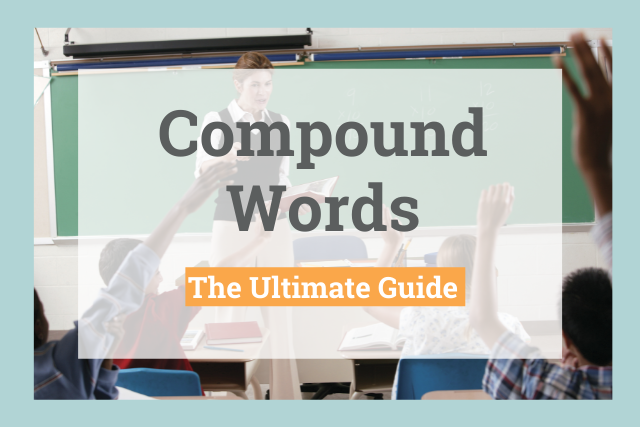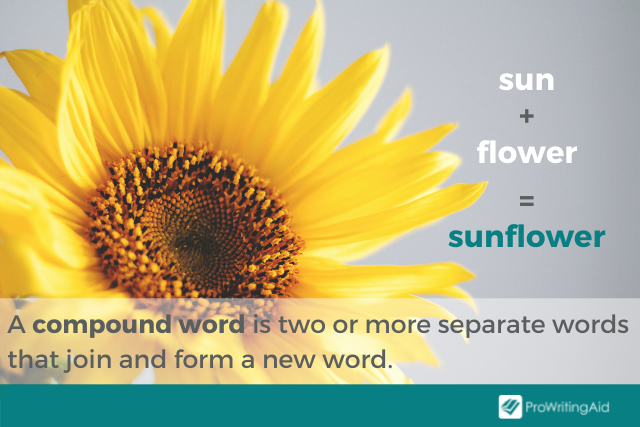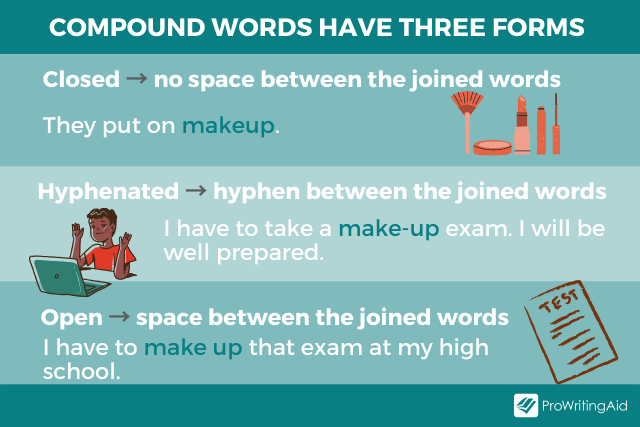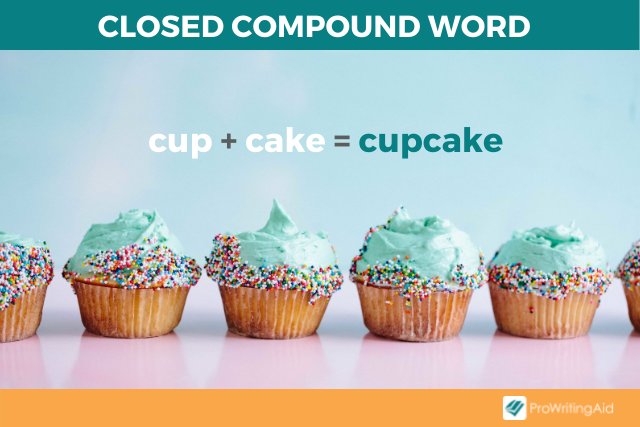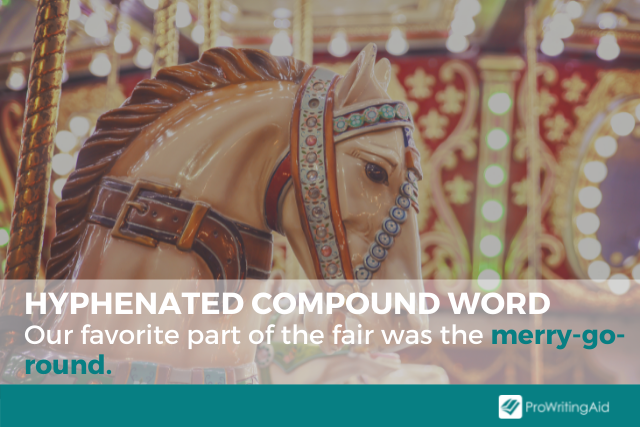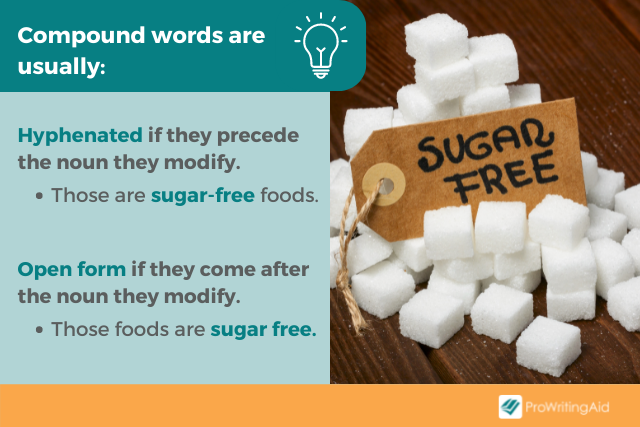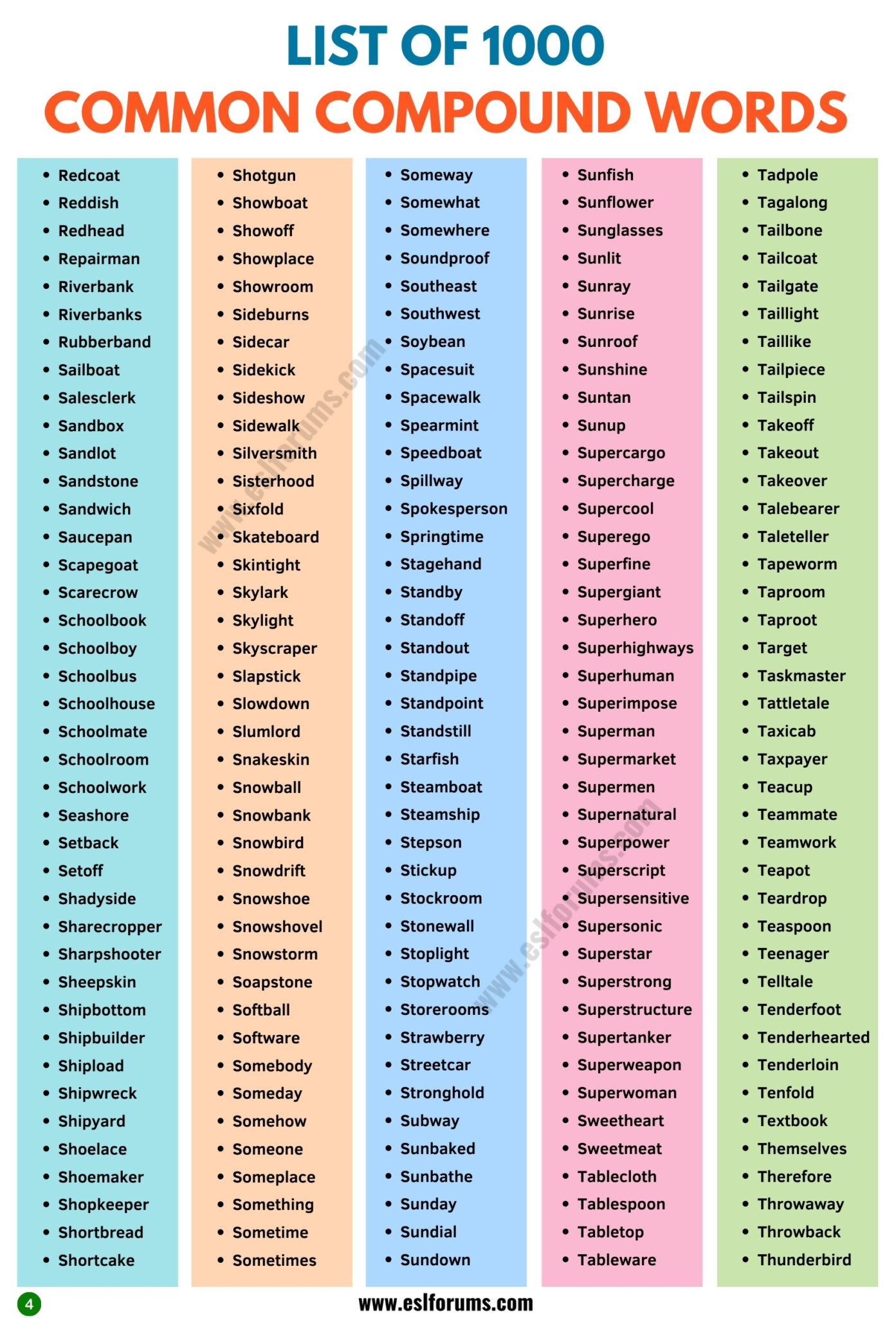The words pancake, living room, and merry-go-round have something in common.
They are all examples of compound words.
The noun compound means something made up of two or more separate components. Compound can also be an adjective meaning consisting of two or more parts or components.
A compound word is one word, or one unit of meaning, that is created by joining two or more separate words together.
What Are Compound Words?
A compound word is a word made up of usually two but sometimes more words that are joined together. The two (or more) that make the compound word are independent words; they have their own distinct meanings. When those words are joined and form a compound word, that compound word has its own new meaning.
The Three Types of Compound Words
Compound words can take three possible forms: closed, open, or hyphenated. In closed form, there is no space between the joined words. In open form, there is a space between the “joined” words that still act as one unit, and in hyphenated form—you guessed it! There is a hyphen between the joined words.
These general “rules”—which are somewhat fluid and flexible—provide guidance as to what format a compound word takes.
-
Closed compound words are usually nouns: They put on makeup.
-
Open compound words are usually nouns or verbs: I have to make up (verb) that exam at my high school. (noun)
-
Hyphenated compound words are usually adjectives or adverb-adjective combinations: I have to take a make-up (adjective) exam. I will be well-prepared. (adverb + adjective)
The key word in each of those examples is “usually.” Some compound words break the rules. We’ll see how soon.
1. Closed Compound Words
To review: closed compound words are usually made up of two separate words that are put together to form a new word. There is no space between the two words in a closed-form compound word; the compound appears as one single word.
Examples of Closed Compound Words
-
Cup + cake becomes cupcake
-
Basket + ball becomes basketball
-
Key + board becomes keyboard
-
Extra + ordinary becomes extraordinary
-
Birth + day becomes birthday
You can see through these examples that the meaning of the compound word is not just a merger of the independent definitions of the individual words that join together to make that compound.
However, there is a relationship between the individual word meanings and the compounds. Compound words have been integrated into language as speakers have discovered those relationships. It makes perfect sense to call a cake that could fit into a cup a cupcake and to call a ball thrown through a basket (now a hoop) a basketball.
The rules for compound words, listed earlier in the post, include the word usually. That word means the rules are not hard and fast, and there are examples of compound words that break those rules.
For example, compound words that are verbs are usually open form, but here are rule-breaking closed-form compound verbs that remind us to hold those rules loosely:
-
I need to proofread my essay.
-
I think the clerk shortchanged me.
-
I have to babysit my little sister.
2. Open Compound Words
In an open compound word, there is a space between the two independent words, though they are still treated as one unit with a new “compound meaning.”
Examples of Open Compound Words
-
Living room: as a unit, this compound noun refers to a room in a house.
-
High school: as a unit, this compound noun refers to a school that has students in grades 9-12.
-
Post office: as a unit, this compound refers to a building where mail is collected, sorted, and sent.
-
Give up: as a unit, this compound verb means to stop trying.
-
Ask for: as a unit, this compound verb means to request something.
3. Hyphenated Compound Words
Hyphenated compound words have hyphens between each of the independent words that serve as connectors. The hyphens are a visual cue that the words form one unit.
Some compound words are always hyphenated.
-
Merry-go-round
-
Mother-in-law (and brother-, sister-, and father-in-law)
-
Self-esteem
Did you notice that all of those examples are nouns? Remember: the rules are flexible!
Examples of Hyphenated Compound Adjectives:
When compound words are used as adjectives (officially known as compound adjectives), the hyphenation rules change depending on where the compound adjective comes in the sentences.
If the compound adjective comes before the noun it modifies (describes), you should usually add a hyphen:
-
High-speed chase
-
Part-time employee
-
Full-time job
-
Fire-resistant pajamas
-
Good-looking person
-
Well-respected politician
-
Up-to-date records
Of course, there are exceptions. Remember, those “rules” are flexible. Some compound adjectives that precede the nouns they modify never take a hyphen. For example, ice cream and high school:
- High school students
- Ice cream sundae
There’s really no “why” to explain these exceptions; we’ve just adopted these forms and made them part of our language.
Examples of Open-Form Compound Adjectives
If the compound adjective comes after the noun it modifies, the hyphen is usually omitted.
-
Make sure the files are up to date. “Up to date” modifies, but comes after, the noun “files.”
-
The cat is two years old. “Two years old” modifies, but comes after, the noun “cat.”
Though post-noun modifiers don’t technically take hyphens, according to Merriam-Webster, usage trends indicate the hyphens are often included anyway, if the compounds “continue to function as unit modifiers.” So there’s that flexibility again.
What About Adverb Compounds?
It’s easy to find examples of closed, open, and hyphenated adverbs.
As for the closed-form examples, we probably don’t even register them as compound words much of the time.
-
Sometimes
-
Thereafter
-
Somewhere
Open-form adverbs occur when the adverb is the first word in the compound and ends in —ly. You should not hyphenate after an —ly adverb.
-
We made the discovery early on.
-
Her opinion is highly regarded.
-
They entered the dimly lit room.
What to Do If You’re Not Sure Which Form Is Right
While those flexible rules can help you, there may still be times when you feel confused about which compound form to use. Don’t stress too much.
According to Merriam Webster, the rules are more like patterns. You may see differences in different publications depending on editorial choice and style. For example, I looked on Amazon for a teapot. I saw mostly teapots, but also a few tea pots. Out of curiosity I put “tea pot” into a New York Times search bar, and found articles from the 1800s that included “tea-pot” in the title!
While interesting, those stylistic changes and choices shouldn’t be too surprising. Language is fluid and ever-evolving. Compound words themselves are proof of that evolution.
Keep Clarity the Focus
The purpose of hyphens in compound words is to ensure clarity. For example,
-
I bought over-the-counter medication.
-
He passed the medicine over the counter.
In the first example, I know by the hyphen that the medicine «I» bought did not require a prescription. «Over-the-counter» is one unit—one compound—describing a type of medicine.
In the second example, «over the counter» is serving another purpose and, while the words form a phrase to tell me where «he» passed the medicine, hyphens do nothing to make the purpose of the phrase clear and are therefore unnecessary.
Now look at these examples:
- He owned a little-used car.
- He owned a little used car.
In the first example, I know the man owns a car that has not been driven much. The car is described by the compound modifier «little-used.»
In the second example, it seems that the man owns a used car that is also small, or little. In this example, putting a comma after «little» would help to separate the two words, «little» and «used,» and show that they aren’t intended to work as a compound.
ProWritingAid Can Help
Though you’re a compound-word expert now, if you find yourself with lingering doubts, remember that ProWritingAid is here to help. It will let you know if you’ve added an unnecessary hyphen after an -ly adverb, or if you’ve left one out of a pre-noun compound adjective. You don’t have to write alone!
Take your writing to the next level:
20 Editing Tips from Professional Writers
Whether you are writing a novel, essay, article, or email, good writing is an essential part of communicating your ideas.
This guide contains the 20 most important writing tips and techniques from a wide range of professional writers.
The word compound means one thing that is composed of two or more elements. When you hear the word compound, you might think of a chemical compound, compound interest, or you might just use the word as a synonym for a mixture. Compounding is also a grammatical phenomenon, and there is a lengthy list of compound words in the English language.
Compound Words Definition
Simply put, compound means one thing made of many things. The definition for compound words means just that.
Compound words: two or more words joined to create a new meaning.
Compound words are not two random words thrust together. Compound words will be two words that are frequently found together, such as late-night, nice-looking, or seafood.
Compound words are usually two base words used together. Remember, base words are standalone words that signal a particular meaning, even when stripped of affixes (example: success in successful).
That’s not to say, however, that compound words can’t use derived words. Derived words are words that are built on a root, typically with the addition of an affix (example: teach + er = teacher). Many compound words include derived words (coffee maker, sewing machine, skyscraper).
The process of compounding is different from derivation and inflection — both of which typically involve adding an affix to change a word’s grammatical category. While derivation, inflection, and compounding are all a process for creating new words, compounding uses two base words, rather than a single base word and an affix (e.g., -ing, im—, or -ed).
Compounding in English Examples
Compounds help us understand words as a single unit, which in some cases helps to clarify the meaning of a word or phrase in English.
Let’s look for a vegan-friendly restaurant.

Using a hyphen here shows the reader that the words vegan and friendly should be taken as a single unit. Otherwise, it might be read as, “Let’s look for a vegan friendly restaurant,” with vegan and friendly being two different adjectives to describe a restaurant.
When new things, ideas, or phrases come into the collective consciousness of the public, they need a name or something people can say to refer to them. Compounding words is one of the most (if not the most) common types of word formation in English because it is so easy to do.
These new words can be figurative like chairman (the head of a committee or group, not a chair-shaped man), or simply a combination of the meaning of each of the base words, like lighthouse (a house of light).
Just email me, and I’ll respond to it later.
The word email wasn’t used until the late twentieth century because email, or electronic mail, didn’t exist until then. There was a need to create a word to communicate this new idea of sending a message electronically, and e-mail —which became email, without the hyphen — was a simple option.
Types of Compound Words
There are three types of compound words: open, closed, and hyphenated.
Open Compounds
Open compound words are formed by combining an adjective with the noun it modifies to create a new noun. These compound words are usually the result of two words being so frequently used together that they eventually come to mean one specific thing.
Shopping cart
Potting soil
Real estate
Even though these words are separated with a space, they’re still considered a single unit. You can tell it’s an open compound word, rather than merely a noun modified by an adjective, because the two words are so regularly used together to mean something specific.
For example, real is not used as the modification of the word estate to express it’s real as opposed to a fake estate. Real estate is the business of buying and selling property and buildings on said property.
Closed Compounds
Closed compound words look the most like a “real word” because there is no space between the two roots.
Keyboard
Pothole
Tablecloth
Two words might form a closed compound because they are so frequently used together.

In the 1990s when someone wanted to connect to the internet, they might say they were going to go on-line (cue the sounds of dial-up internet and a male voice saying, “You’ve got mail”). Today in the twenty-first century, the internet is a part of our everyday experience, and so the word has lost its hyphen and is typically shortened to online.
Hyphenated Compounds
The final type of compound words are hyphenated compounds. These are words that — just like closed and open compounds — are frequently used together. The hyphen connects these words, so they function as one unit.
A hyphen (-) is a punctuation mark that shouldn’t be confused with a dash (–). A hyphen connects two words or word parts, whereas dashes indicate a pause or range. Dashes can be short (an “en dash” which is the length of the letter n) or long (an “em dash” which is the length of the letter m).
Long-term
Close-up
Empty-handed
Many hyphenated compounds become closed compounds if they’re used frequently enough.
Hyphenating Compound Words
You might wonder, “How do I know when to hyphenate a compound word?” There are many rules regarding hyphens in general, and here are the ones that are key in hyphenating compound words.
-
Only hyphenate when the compound comes before the noun it will modify. If it comes after, don’t include a hyphen.
The man-eating bear was only a few yards away. vs. The bear was definitely a man eater.
-
When a compound modifier contains an adverb ending in -ly and a participle or adjective, don’t use a hyphen.
A highly contested race.
Unfortunately, there is not always a consensus about whether to hyphenate compound words or create a closed compound word. If you’re ever in doubt about whether to hyphenate a compound word, consult a dictionary or the appropriate style guide for a definitive answer.
Compound Words List
Here is a longer compound words list for reference.
Open Compound Words
-
Sun room
-
Cheer up
-
Summer break
-
Garage sale
-
Dress up
-
Fire pit
-
Jumping jack
-
Science fiction
-
Vice President
-
Swimming pool
Closed Compound Words
-
Dishware
-
Bookstore
-
Seatbelt
-
Birthday
-
Carpool
-
Limelight
-
Comeback
-
Candlelit
-
Football
-
Lawsuit
Hyphenated Compound Words
-
House-of-mirrors
-
Self-contempt
-
Father-in-law
-
Well-read
-
Full-length
-
Free-fall
-
High-rise
-
Life-size
-
Deep-fried
-
Right-handed
Compounding — Key takeaways
- Compound words are two or more words joined to create a new meaning.
- Compound words are usually two base words used together.
- Compounds help us understand words as a single unit, which in some cases helps to clarify the meaning of a word or phrase.
- There are three types of compound words: open, closed, and hyphenated.
- There is not always a consensus about whether to hyphenate compound words or create a closed compound word.
Anybody Can Learn About Compound Words. Here’s Everything You Need To Know
powered by
LanguageTool
Compounds words are when two or more words are joined together, creating a new word. Read on to learn about the many types of compound words.
Correct Use
- Compound words are when two or more words are joined, creating a different word with another distinct meaning.
- There are different types of compound words: open (high school), closed (grandmother), or hyphenated (two-fold).
- Compound words include compound nouns (stereotype), compound adjectives (everlasting), and compound verbs (greenwash).
What do a honeybee, butterfly, earthworm, and jitterbug have in common? That they’re all insects? Nope! That they’re compound words. We’ll teach you everything you need to know about compound words, from what they are to the different types.
Think of the word fire. You might be picturing something similar to flames of bright light, heat, and smoke. Now, think of the word fighter. You’re most likely thinking of something or someone that fights, like a boxer or soldier. Now, put these two words together: firefighter. What do you imagine? A person whose career is to put out and extinguish fires. This is an example of a compound word—two words with separate meanings combined to create an entirely new word.
Types of Compound Words
There are a few types of compound words, including:
- Compound nouns
- Compound adjectives
- Compound verbs
These can be written as either open, closed, or hyphenated compounds. Open compounds are compounds that have a space between each word (e.g., full moon). Closed compounds don’t have a space (e.g., daybed), and hyphenated compounds have a hyphen separating each word (e.g., up-to-date).
Compound Nouns
A compound noun is made up of a noun plus another noun. Take moonlight as an example. However, compound nouns are also made using other parts of speech, like verbs and adjectives.
Think of the word haircut. Hair on its own is a noun. Cut is often used as a verb, but when you put those two words together, it becomes a noun again. Please note that the order of a compound noun is not limited to noun + noun, or noun + other parts of speech. Many combinations can produce a compound noun. For example, a verb + a noun can also create a compound noun (e.g., swimsuit).
There are opened, closed, and hyphenated compound nouns. Below are a few examples of each.
| Open | Closed | Hyphenated |
|---|---|---|
| Black eye (adjective + noun) |
Payday (verb + noun) |
Check-in (verb + preposition) |
| Slam dunk (verb + noun) |
Lookout (verb + adverb) |
Well-being (noun + verb) |
| Quick fix (adjective + noun) |
Breakfast (verb + noun) |
Two-fold (noun + noun) |
| Washing machine (verb + noun) |
Skateboard (verb + noun) |
Take-out (verb + preposition) |
| Close call (adjective + noun) |
Turntable (verb + noun) |
Merry-go-round (adjective + verb + adverb) |
Often, many words start as open compound words, and eventually turn into closed compound words (e.g., notebook). There are a few standards that can be remembered to know whether a compound word should be opened, closed, or hyphenated. For example, a noun + noun compound word is usually closed (e.g., boyfriend). A compound word that uses a verb + “ing” is often written as an open compound (e.g., dry cleaning).
Compound Adjectives
Compound adjectives are two words joined into one to describe a noun (or compound noun). Like compound nouns, they can contain different parts of speech. Compound adjectives are mostly written with hyphens, but there are also opened and closed forms of these words.
Here are a few examples of compound adjectives:
- Noun + noun + adjective:
Last time she walked by the lake, she saw a seven-foot-long alligator.
- Adjective + noun:
They were in a long-distance relationship for seven years.
- Adverb + past participle:
A new school had to be built because the old one was overpopulated.
Quick Tip
As with most English language rules, the rules for compound nouns and compound adjectives are not set in stone. Knowing when to use what type of compound word takes practice and familiarization. Your best bet would be writing with an easy-to-use spell and grammar checker like LanguageTool. Not only will this writing assistant make sure you consistently use the correct form of a compound word, but it will also conveniently provide synonyms and offer stylistic improvements.
Compound Verbs
There are several types of compound verbs, like phrasal verbs, prepositional verbs, and helping verbs. Here, we are only going to focus on single-word compound verbs. Like in compound nouns and adjectives, these verbs are made by joining two words. Below are a few examples of compound verbs:
I was looking for someone who could babysit my kids for the weekend.
He was notorious for overcooking steaks.
For her birthday, she wanted to test-drive a new Ferrari.
I didn’t want to overstay my visit.
He had to sound-proof his apartment.
Keep in mind that compound verbs are usually written with a hyphen or as a closed compound.
When it comes to compound words, here’s what you should remember: There are many types, like compound nouns, adjectives, and verbs. These can come as open compound words (which have a space between the words), closed compound words (don’t have a space), and hyphenated compounds (the words are separated by a hyphen).
Many compound words have multiple acceptable ways of being written. Sometimes, they start with a space and through years of use, the space is eventually removed. The ambiguity of compound words is what makes them difficult to master. That’s why it’s worth reiterating that you should always have a user-friendly text editor like LanguageTool to help you get the correct spelling (and spacing) of compound words.
Unleash the Professional Writer in You With LanguageTool
Go well beyond grammar and spell checking. Impress with clear, precise, and stylistically flawless writing instead.
Get started for free
We Value Your Feedback
We’ve made a mistake, forgotten about an important detail, or haven’t managed to get the point across? Let’s help each other to perfect our writing.
Every word has its own meaning. You can search for the definition of every term in the dictionary. But do you know that you can put two words together and have a brand new meaning? Of course, not all words can be put together for such a case. However, many ones are already accepted in the English language. These words are called compound words.
What Are Compound Words?
Compound words are formed when two or more words are combined to produce a new one. This newly-constructed word has its own meaning that can either be related to the base words or not.
Types of Compound Words
Open Compound Words
Open compound words remain separate when written but are used together to create a new idea. For example, “peanut” and “butter” are unrelated to each other. But when you combine them and use them as one word, you will have “peanut butter,” which is already a different noun with its own meaning.
Closed Compound Words
Closed compound words are formed by combining two fully independent words together without space in between. An example of a closed-form compound word is “grandfather,” in which “grand” and “father” are put together.
Hyphenated Compound Words
Another possible form of a compound word is the hyphenated one. From the word itself, the independent terms used are separated by a hyphen or dash. A common example is “mother-in-law.”
Compound Nouns
Compound nouns are simply compound words that act as nouns. Nouns are names of people, animals, places, things, or events. However, it does not mean that the two words comprising it should only be nouns. A compound noun can be formed by combining two nouns, an adjective and a noun, a verb and a noun, and many more.
Compound Verbs
A compound verb is also called a complex predicate. It is a multi-word compound that acts as a single verb. It can be constructed by putting together a verb and a preposition or a verb and an adverb (phrasal verbs). Auxiliary verbs that are followed by the main verb can also be considered compounds. Some other combinations that involve a verb and a non-verb word can also be considered compound verbs if they indicate action.
Compound Adjectives
Two or more words that function as one and describe a noun are called compound adjectives. Usually, they are separated by a hyphen.
List of Compound Words
Open Compound Words
- Ice cream
- Ice cream cake
- Ice cube
- Cream cheese
- Hot dog
- Corn dog
- Corned beef
- Apple pie
- Sugar plum
- Web page
- Table cloth
- Fire drill
- Fire drill
- Fire exit
- High school
- Roller coaster
- Living room
- First aid
- Full moon
- Tea cup
- Serving spoon
- Real estate
- Car pool
- Cotton bud
- Cotton ball
- Video game
- Coffee grain
- Coffee mug
- Post office
- Upper deck
- Hand towel
- Sweet tooth
- Common sense
- Dance hall
- Police officer
- Vice president
- Science fiction
- Root word
- Candy cane
- Christmas tree
- Cell membrane
- Jumping jack
- Report card
- Credit card
- Debit card
- Radio wave
- Snack house
- Coffee shop
- Bus stop
- Swimming pool
- Rubber band
- Ice hockey
- Ice skate
- Break up
- Take away
- Take out
- Break away
- Lift up
- Push down
- Pull down
- Ask out
- Ask around
- Make up
- Turn in
- Fill up
- Fill out
- Fill in
Closed Compound Words
- Basketball
- Football
- Baseball
- Worldwide
- Overpass
- Southeast
- Northeast
- Northwest
- Southwest
- Bushfire
- Mailbox
- Snowball
- Skateboard
- Sailboat
- Birthday
- Blackboard
- Everything
- Anything
- Anyone
- Everyone
- Classmate
- Schoolmate
- Playmate
- Grandmother
- Grandfather
- Granddaughter
- Grandson
- Grasshopper
- Sunflower
- Sunrise
- Sunshine
- Moonlight
- Freelance
- Eyeball
- Eyebrow
- Eyelash
- Armpit
- Playground
- Teamwork
- Stoplight
- Flashlight
- Lighthouse
- Fireman
- Rainbow
- Raindrop
- Bedroom
- Popcorn
- Keyboard
- Notepad
- Keyhole
- Keystone
- Pothole
- Bowtie
- Necktie
- Brainwash
- Proofread
- Babysit
- Horseshoe
- Highlight
- Notebook
- Bookstore
- Lipstick
- Makeup
- Toothpaste
- Toothbrush
- Airbrush
- Crosswalk
- Crossroad
- Crossover
- Nightfall
- Riverbank
- Nutcracker
- Candlelight
- Backstroke
- Hamburger
- Cheeseburger
- Sandwich
- Homesick
- Uptown
- Rattlesnake
- Workplace
- Wrongdoing
- Springtime
- Underdog
- Strawberry
- Blueberry
- Watermelon
- Pineapple
- Cupcake
Hyphenated Compound Words
- Mother-in-law
- Father-in-law
- Sister-in-law
- Brother-in-law
- Sergeant-at-arms
- Merry-go-round
- Happy-go-lucky
- Editor-in-chief
- Over-the-counter
- Up-to-date
- State-of-the-art
- Long-term
- High-speed
- Left-handed
- Right-handed
- In-depth
- Full-length
- Part-time
- Long-haired
- Sun-dried
- Breath-taking
- Self-centered
- Well-off
- Well-known
- Gift-wrap
- Follow-up
- Well-being
- Single-minded
- Knee-length
- Short-tempered
- Off-site
- Runner-up
- One-sided
- Tip-off
- Blush-on
- Sugar-free
- Ice-cold
- Far-flung
- High-rise
- Life-size
- King-size
- Warm-blooded
- Cold-blooded
- Get-together
- Next-door
A Huge List of Compound Words
Following is a list of 1000 close compound words in English
- Aboveboard
- Afterbirth
- Afterburner
- Afterglow
- Afterimage
- Afterlife
- Aftermath
- Afternoon
- Airbrush
- Aircraft
- Airfield
- Airlift
- Airline
- Airliner
- Airmail
- Airman
- Airmen
- Airplane
- Airport
- Airship
- Airtime
- Allover
- Allspice
- Alongside
- Also
- Another
- Anybody
- Anyhow
- Anymore
- Anyone
- Anyplace
- Anything
- Anytime
- Anyway
- Anywhere
- Armchair
- Armpit
- Around
- Arrowhead
- Ashtray
- Authorship
- Babysit
- Babysitter
- Backache
- Backbite
- Backbone
- Backbreaker
- Backdrop
- Backfield
- Backfire
- Background
- Backhand
- Backlash
- Backlog
- Backpack
- Backside
- Backslap
- Backslide
- Backspace
- Backspin
- Backstage
- Backstop
- Backstretch
- Backstroke
- Backtrack
- Backward
- Ballpark
- Ballroom
- Bankbook
- Bankroll
- Baseball
- Basketball
- Beachcomb
- Became
- Because
- Become
- Bedbug
- Bedclothes
- Bedrock
- Bedroll
- Bedroom
- Bellbottom
- Bellboy
- Bellhop
- Below
- Birthday
- Blackball
- Blackberries
- Blackbird
- Blackboard
- Blackjack
- Blacklist
- Blackmail
- Blackout
- Blacksmith
- Blacktop
- Bluebell
- Blueberry
- Bluebird
- Bluefish
- Bluegrass
- Blueprint
- Boardwalk
- Bodyguard
- Bodywork
- Boldface
- Bookbinder
- Bookcase
- Bookend
- Bookkeeper
- Booklet
- Bookmark
- Bookmobile
- Bookseller
- Bookshelf
- Bookstore
- Bookworm
- Bootstrap
- Bowtie
- Brainchild
- Brainstorm
- Brainwash
- Bugspray
- Bushfire
- Buttercup
- Butterfat
- Butterfingers
- Butterflies
- Buttermilk
- Butternut
- Butterscotch
- Bypass
- Cabdriver
- Cancan
- Candid
- Candlelight
- Candlestick
- Cannot
- Cardboard
- Cardsharp
- Cardstock
- Carefree
- Caretaker
- Careworn
- Carfare
- Cargo
- Carhop
- Carload
- Carpetbagger
- Carpool
- Carport
- Carrack
- Carryall
- Carsick
- Cartwheel
- Carwash
- Cattail
- Catwalk
- Caveman
- Centercut
- Cheeseburger
- Cheesecake
- Classmate
- Clockwise
- Coffeemaker
- Comeback
- Comedown
- Commonplace
- Commonwealth
- Cornball
- Cornmeal
- Cornstalk
- Cornwall
- Cottonmouth
- Cottontail
- Cottonwood
- Countdown
- Counterattack
- Counterbalance
- Counterclockwise
- Counterintelligence
- Countermeasure
- Counteroffensive
- Counterpane
- Counterpart
- Counterpoint
- Counterpoise
- Courthouse
- Courtroom
- Courtyard
- Crewcut
- Crossbow
- Crossbreed
- Crosscut
- Crossover
- Crossroad
- Crosstown
- Crosswalk
- Crossword
- Cupcake
- Dairymaid
- Daisywheel
- Daybed
- Daybook
- Daybreak
- Daydream
- Daylight
- Daytime
- Deadend
- Deadline
- Dishcloth
- Dishpan
- Dishwasher
- Dishwater
- Diskdrive
- Dogwood
- Doorstop
- Downbeat
- Downunder
- Drawbridge
- Driveway
- Duckbill
- Duckpin
- Earache
- Eardrop
- Eardrum
- Earring
- Earthbound
- Earthquake
- Earthward
- Earthworm
- Egghead
- Eggshell
- Elsewhere
- Everyone
- Everything
- Eyeball
- Eyeballs
- Eyebrow
- Eyecatching
- Eye-catching
- Eyeglasses
- Eyelash
- Eyelid
- Eyesight
- Eyewitness
- Fatherland
- Fatherless
- Firearm
- Fireball
- Fireboat
- Firebomb
- Firebox
- Firebreak
- Firecracker
- Firefighter
- Fireflies
- Firehouse
- Fireman
- Fireproof
- Firewater
- Fireworks
- Fishbowl
- Fisherman
- Fisheye
- Fishhook
- Fishlike
- Fishmonger
- Fishnet
- Fishpond
- Fishtail
- Flashlight
- Football
- Foothill
- Foothold
- Footlights
- Footlocker
- Footnote
- Footpath
- Footprints
- Footrest
- Forbearer
- Forbid
- Forearm
- Forebear
- Forecast
- Forecastle
- Foreclose
- Foreclosure
- Foredoom
- Forefather
- Forefinger
- Forefront
- Forehand
- Forehead
- Foreleg
- Foreman
- Foremost
- Forepaws
- Forerunner
- Foresee
- Foresight
- Forestall
- Forestland
- Forever
- Forget
- Forgive
- Forklift
- Format
- Fortnight
- Freelance
- Friendship
- Fruitcup
- Gearshift
- Glassmaking
- Goodbye
- Goodnight
- Grandaunt
- Grandchild
- Grandchildren
- Granddaughter
- Grandfather
- Grandmaster
- Grandmother
- Grandnephew
- Grandnieces
- Grandparent
- Grandson
- Grandstand
- Granduncle
- Grasshopper
- Graveyard
- Gumball
- Haircut
- Hamburger
- Hammerhead
- Hamstring
- Handball
- Handbook
- Handcuff
- Handgun
- Handmade
- Handout
- Headache
- Headdress
- Headhunter
- Headlight
- Headline
- Headquarters
- Hedgehop
- Heirloom
- Hellcat
- Hellhole
- Helpmate
- Helpmeet
- Hemstitch
- Henceforth
- Henchman
- Henpeck
- Hereabout
- Hereafter
- Hereby
- Herein
- Hereof
- Hereupon
- Herself
- Highball
- Highchair
- Highland
- Highlight
- Highway
- Himself
- Homemade
- Homesick
- Hometown
- Honeybee
- Honeycomb
- Honeydew
- Honeymoon
- Honeysuckle
- Hookup
- Hookworm
- Horseback
- Horsefly
- Horsehair
- Horseplay
- Horsepower
- Horseradish
- Horseshoe
- Houseboat
- Housecoat
- Household
- Housekeeper
- Housetop
- Housewife
- Housework
- However
- Ideal
- Inchworm
- Income
- Indoors
- Inflow
- Infold
- Infuse
- Infusion
- Inhale
- Inkblot
- Inkwell
- Inland
- Inmate
- Inpatient
- Inroad
- Inset
- Inside
- Intake
- Ironwork
- Itself
- Jackpot
- Jackson
- Jailbait
- Jailbird
- Jawbone
- Jawbreaker
- Jaywalk
- Jellybean
- Jellyfish
- Jerkwater
- Jerrybuild
- Jetliner
- Jetport
- Jigsaw
- Jimsonweed
- Jitterbug
- Jobholder
- Johnnycake
- Jumpshot
- Keepsake
- Keyboard
- Keyhole
- Keynote
- Keypad
- Keypunch
- Keystone
- Keystroke
- Keyway
- Keyword
- Landmark
- Landslide
- Landward
- Lapland
- Lapwing
- Larkspur
- Laughingstock
- Lawgiver
- Lawmaker
- Lawsuit
- Layman
- Layoff
- Layout
- Layover
- Leapfrog
- Lifeblood
- Lifeboat
- Lifeguard
- Lifelike
- Lifeline
- Lifelong
- Lifesaver
- Lifetime
- Lifework
- Lighthouse
- Limelight
- Limestone
- Lipstick
- Longhand
- Longhorn
- Longhouse
- Lukewarm
- Mailbox
- Mainland
- Mainline
- Mainspring
- Mainstream
- Makeup
- Matchbox
- Meadowland
- Meantime
- Meanwhile
- Moonbeam
- Moonlight
- Moonlit
- Moonscape
- Moonshine
- Moonstone
- Moonstruck
- Moonwalk
- Moreover
- Mothball
- Motherhood
- Motorcycle
- Nearby
- Necktie
- Nevermore
- Newborn
- Newfound
- Newsboy
- Newsbreak
- Newscast
- Newscaster
- Newsdealer
- Newsletter
- Newsman
- Newsmen
- Newspaper
- Newsperson
- Newsprint
- Newsreel
- Newsroom
- Newsstand
- Newsworthy
- Nightfall
- Nobody
- Noisemaker
- Northeast
- Northwest
- Notebook
- Notepad
- Noteworthy
- Nowhere
- Nursemaid
- Nutcracker
- Oneself
- Onetime
- Overabundance
- Overboard
- Overcoat
- Overflow
- Overland
- Overpass
- Overshoes
- Pacemaker
- Pancake
- Parkway
- Passbook
- Passkey
- Passover
- Passport
- Password
- Pasteboard
- Patchwork
- Pathfinder
- Pathway
- Pawnbroker
- Pawnshop
- Paycheck
- Payload
- Paymaster
- Payoff
- Payroll
- Peppermint
- Pickup
- Pineapple
- Pinhole
- Pinpoint
- Pinstripe
- Pinup
- Pinwheel
- Playback
- Playboy
- Playground
- Playhouse
- Playmate
- Playthings
- Ponytail
- Popcorn
- Postcard
- Pothole
- Proofread
- Racquetball
- Railroad
- Railway
- Rainbow
- Raincheck
- Raincoat
- Raindrop
- Rainfall
- Rainmaker
- Rainstorm
- Rainwater
- Ratline
- Ratsbane
- Rattlesnake
- Rattletrap
- Rawboned
- Rawhide
- Readywitted
- Rearmost
- Rearrange
- Rearward
- Redcap
- Redcoat
- Reddish
- Redhead
- Repairman
- Riverbank
- Riverbanks
- Rubberband
- Sailboat
- Salesclerk
- Sandbox
- Sandlot
- Sandstone
- Sandwich
- Saucepan
- Scapegoat
- Scarecrow
- Schoolbook
- Schoolboy
- Schoolbus
- Schoolhouse
- Schoolmate
- Schoolroom
- Schoolwork
- Seashore
- Setback
- Setoff
- Shadyside
- Sharecropper
- Sharpshooter
- Sheepskin
- Shipbottom
- Shipbuilder
- Shipload
- Shipwreck
- Shipyard
- Shoelace
- Shoemaker
- Shopkeeper
- Shortbread
- Shortcake
- Shotgun
- Showboat
- Showoff
- Showplace
- Showroom
- Sideburns
- Sidecar
- Sidekick
- Sideshow
- Sidewalk
- Silversmith
- Sisterhood
- Sixfold
- Skateboard
- Skintight
- Skylark
- Skylight
- Skyscraper
- Slapstick
- Slowdown
- Slumlord
- Snakeskin
- Snowball
- Snowbank
- Snowbird
- Snowdrift
- Snowshoe
- Snowshovel
- Snowstorm
- Soapstone
- Softball
- Software
- Somebody
- Someday
- Somehow
- Someone
- Someplace
- Something
- Sometime
- Sometimes
- Someway
- Somewhat
- Somewhere
- Soundproof
- Southeast
- Southwest
- Soybean
- Spacesuit
- Spacewalk
- Spearmint
- Speedboat
- Spillway
- Spokesperson
- Springtime
- Stagehand
- Standby
- Standoff
- Standout
- Standpipe
- Standpoint
- Standstill
- Starfish
- Steamboat
- Steamship
- Stepson
- Stickup
- Stockroom
- Stonewall
- Stoplight
- Stopwatch
- Storerooms
- Strawberry
- Streetcar
- Stronghold
- Subway
- Sunbaked
- Sunbathe
- Sunday
- Sundial
- Sundown
- Sunfish
- Sunflower
- Sunglasses
- Sunlit
- Sunray
- Sunrise
- Sunroof
- Sunshine
- Suntan
- Sunup
- Supercargo
- Supercharge
- Supercool
- Superego
- Superfine
- Supergiant
- Superhero
- Superhighways
- Superhuman
- Superimpose
- Superman
- Supermarket
- Supermen
- Supernatural
- Superpower
- Superscript
- Supersensitive
- Supersonic
- Superstar
- Superstrong
- Superstructure
- Supertanker
- Superweapon
- Superwoman
- Sweetheart
- Sweetmeat
- Tablecloth
- Tablespoon
- Tabletop
- Tableware
- Tadpole
- Tagalong
- Tailbone
- Tailcoat
- Tailgate
- Taillight
- Taillike
- Tailpiece
- Tailspin
- Takeoff
- Takeout
- Takeover
- Talebearer
- Taleteller
- Tapeworm
- Taproom
- Taproot
- Target
- Taskmaster
- Tattletale
- Taxicab
- Taxpayer
- Teacup
- Teammate
- Teamwork
- Teapot
- Teardrop
- Teaspoon
- Teenager
- Telltale
- Tenderfoot
- Tenderhearted
- Tenderloin
- Tenfold
- Textbook
- Themselves
- Therefore
- Throwaway
- Throwback
- Thunderbird
- Thunderbolt
- Thundershower
- Thunderstorm
- Timekeeper
- Timepieces
- Timesaving
- Timeshare
- Timetable
- Today
- Together
- Toolbox
- Toothbrush
- Toothpaste
- Toothpick
- Touchdown
- Township
- Turnabout
- Turnaround
- Turnbuckle
- Turncoat
- Turndown
- Turnkey
- Turnoff
- Turnover
- Turntable
- Typewriter
- Underachieve
- Underact
- Underage
- Underarm
- Underbelly
- Underbid
- Undercharge
- Underclothes
- Undercover
- Undercurrent
- Undercut
- Underdevelop
- Underdog
- Underesimate
- Underestimate
- Underexpose
- Underfeed
- Underfinance
- Underfoot
- Underfur
- Undergarment
- Undergird
- Undergo
- Undergraduate
- Underground
- Undergrowth
- Underhand
- Underhanded
- Underlayer
- Underlie
- Upbeat
- Upbringing
- Upcoming
- Update
- Updraft
- Upend
- Upgrade
- Upheaval
- Upheld
- Uphill
- Uphold
- Upkeep
- Upland
- Uplift
- Uplink
- Upload
- Upmarket
- Upon
- Uppercase
- Upperclassman
- Uppercut
- Uppermost
- Upright
- Uprising
- Upriver
- Uproar
- Uproot
- Upset
- Upshot
- Upside
- Upstage
- Upstairs
- Upstanding
- Upstart
- Upstate
- Upstream
- Upsurge
- Upswing
- Uptake
- Upthrust
- Uptight
- Uptime
- Uptown
- Upturn
- Upward
- Upwind
- Waistband
- Waistcoat
- Waistline
- Walkout
- Walkways
- Wallboard
- Walleyed
- Wallflower
- Wallpaper
- Wanderlust
- Wardroom
- Warehouse
- Warfare
- Warhead
- Warlike
- Warlord
- Warmblooded
- Warmhearted
- Warmonger
- Warpath
- Warplanes
- Warship
- Wartime
- Washboard
- Washbowl
- Washcloth
- Washout
- Washroom
- Washstand
- Washtub
- Wastebasket
- Wasteland
- Wastepaper
- Wastewater
- Watchband
- Watchcase
- Watchdog
- Watchmaker
- Watchman
- Watchtower
- Watchword
- Watercolor
- Watercooler
- Watercraft
- Waterfall
- Waterfowl
- Waterfront
- Waterline
- Waterlog
- Watermark
- Watermelon
- Waterpower
- Waterproof
- Waterscape
- Watershead
- Waterside
- Waterspout
- Watertight
- Waterway
- Waterwheel
- Waterworks
- Wavelength
- Wavelike
- Waxwork
- Waybill
- Wayfarer
- Waylaid
- Wayside
- Wayward
- Weathercock
- Weatherman
- Weatherproof
- Weekday
- Weekend
- Weeknight
- Whatever
- Whatsoever
- Wheelbarrow
- Wheelbase
- Wheelchair
- Wheelhouse
- Whitecap
- Whitefish
- Whitewall
- Whitewash
- Widespread
- Wipeout
- Without
- Woodshop
- Workplace
- Worldwide
- Wrongdoing
Compound Words | Images
What Are Compound Words?
Compound words are two or more words, each with separate meanings, that join together to form a new word with its own meaning.
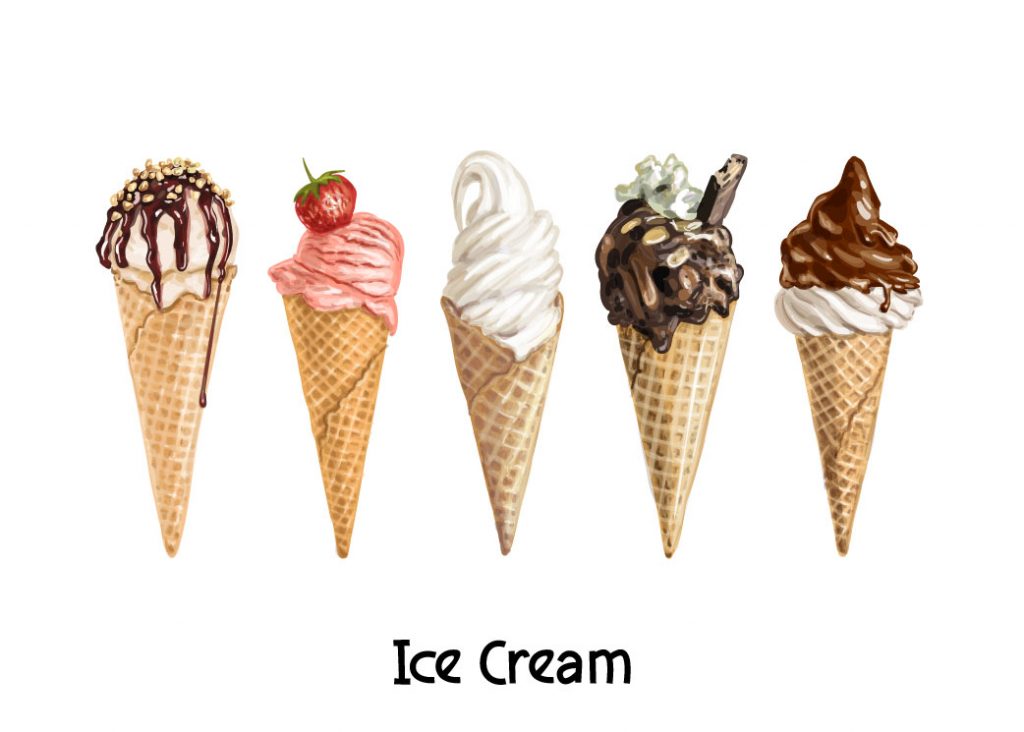
Why Learn Compound Words?
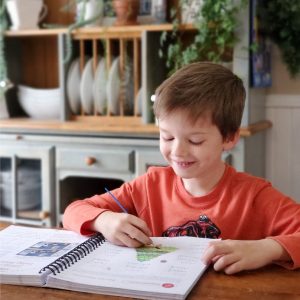
Children begin learning compound words in The Good and the Beautiful Language Arts Level 1 course. They learn that a compound word is made of two words joined together. Learning to read compound words introduces new readers to longer words.
Children in Language Arts Level 1 read simple one- to two-syllable words like bath, tub, butter, and fly. Joining words like these into compound words boosts confidence as children read longer words with ease. Learn more about our FREE homeschool curriculum here.
Compound Words for Kids
We have gathered a list of more than 300 common compound words for kids. A printable version of this list is in our free download below.
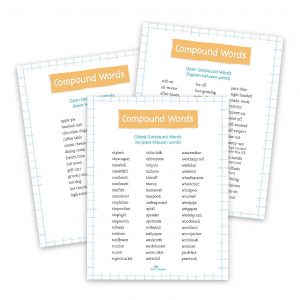
Compound Words for Advanced Readers
The compound words shared so far in this blog are called closed compound words, two words joined together to form a single new word. Two other types of compound words are open and hyphenated.
Readers recognize open compound words as two separate words that team up to have one joint meaning. For example, “peanut butter” is two separate words that team together to form one meaning. Here are some other examples.
When to Hyphenate Compound Words
Knowing exactly when to use a hyphen or space between compound words gets tricky. The easiest way to learn when to use each is by becoming familiar with seeing compound words in print. Reading great books builds children’s vocabulary and helps them know when to hyphenate compound words!

Reading great books builds children’s vocabulary!
Hyphenated compound words are easy to identify by a hyphen, rather than a space, used between each word. The rules for when to use a hyphen in a compound word can be a bit confusing.
For example, in the sentence, “He took a year-long journey through South America,” a hyphen is used between the words year and long because the words are used as an adjective.
Used as nouns, however, hyphenated compound words look like this: “We gave the traveler a big send-off as he boarded the plane.”
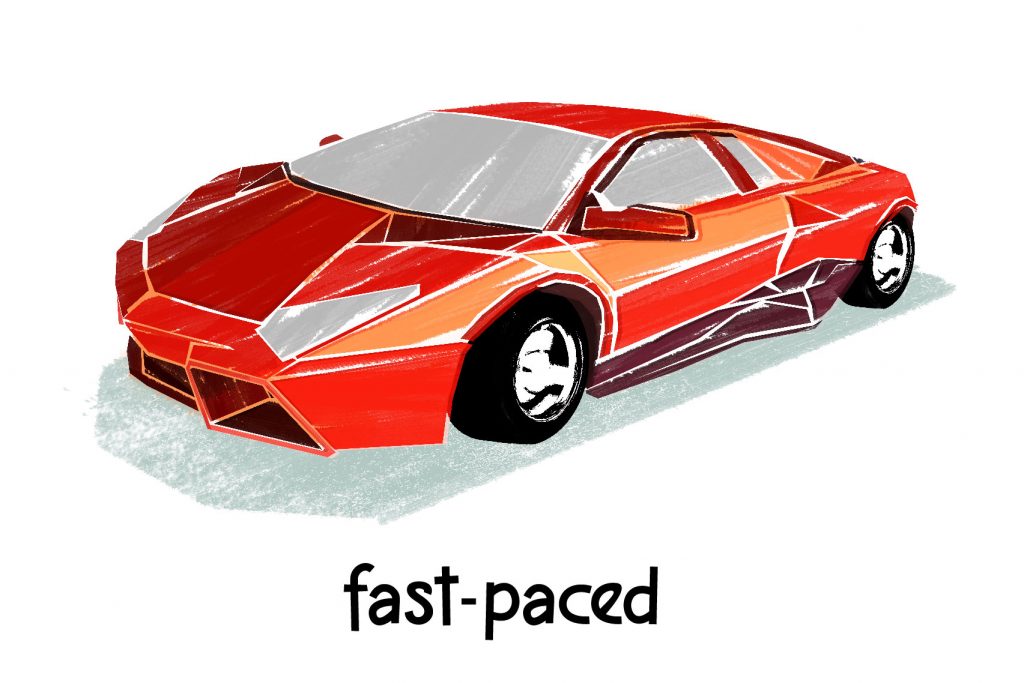
Practice compound words with our fun, one-of-a-kind Luke and Lily of the Lighthouse Game (and accompanying Book Set!).
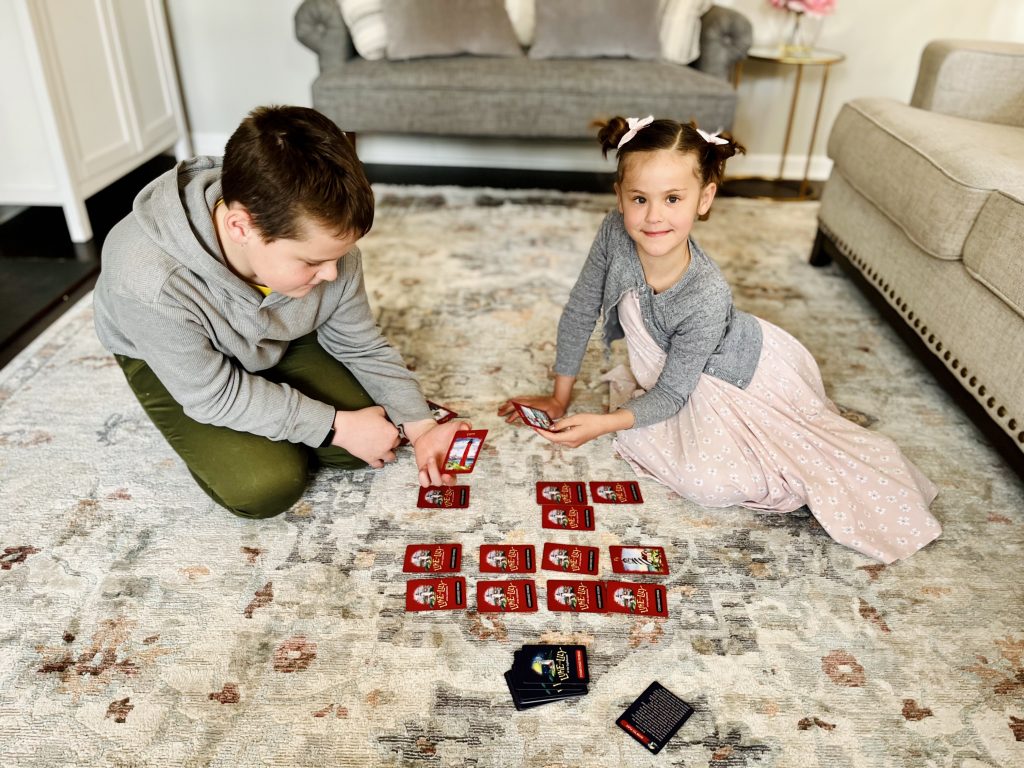
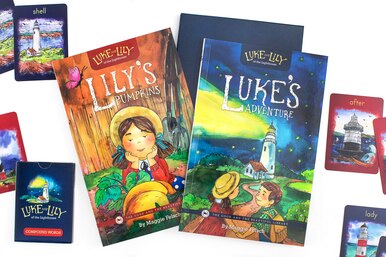
Download our free Compound Words list (with more than 300 compound words)!

You may also like:
The Truth About The Good and the Beautiful
Next Post

